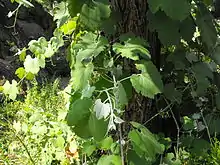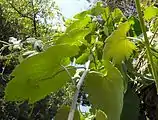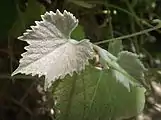Vitis girdiana
Vitis girdiana is as species of wild grape known as the desert wild grape, coyote grape, or valley grape.[1] It is native to southern California in the United States and to Baja California in Mexico.[1][2][3][4]
| Coyote grape | |
|---|---|
 | |
| Scientific classification | |
| Kingdom: | Plantae |
| Clade: | Tracheophytes |
| Clade: | Angiosperms |
| Clade: | Eudicots |
| Clade: | Rosids |
| Order: | Vitales |
| Family: | Vitaceae |
| Genus: | Vitis |
| Species: | V. girdiana |
| Binomial name | |
| Vitis girdiana | |
Vitis girdiana is a woody vine with a coating of woolly hairs, especially on new growth. The woolly leaves are heart-shaped to kidney-shaped with toothed edges and sometimes shallow lobes. The inflorescence is a panicle of unisexual flowers. The fruit is a spherical black grape usually not more than 8 millimeters wide.[2]
It grows in canyon and streambank habitat in hills and mountains of the region.[2]
Uses
Various Native American groups used the fruit. The Kumeyaay ate the fruit fresh or dried into raisins and cooked, they also rubbed the sap on falling or thin hair to help its health and make it grow.[5] The Luiseño called it Makwit and cooked the fruit for food.[6] The Cahuilla used it fresh, cooked, or dried into raisins, and made it into wine.[7]
Gallery
References
- "Vitis girdiana". Germplasm Resources Information Network. Agricultural Research Service, United States Department of Agriculture. Retrieved 16 December 2017.
- Vitis girdiana. The Jepson Manual.
- Biota of North America Program 2014 county distribution map
- Calflora taxon report, University of California @ Berkeley
- Hedges, Ken (1986). "Santa Ysabel Ethnobotany". Ethnic Technology Notes. San Diego Museum of Man. Number 20: 43.
- Sparkman, Philip Stedman (7 August 1908). "The Culture of the Luiseño Indians" (PDF). University of California Publications in American Archaeology and Ethnology. Berkeley University Press. 8 (4): 231.
Vitaceae. Grape-vine Family. Vitis giridiana. Makwit. Wild grape-vine. The fruit is cooked and used for food.
- Bean, Lowell John; Saubel, Katherine Siva; Lawton, Harry W; Bean, Lowell John (1972). Temalpakh (from the earth): Cahuilla Indian knowledge and usage of plants. Malki Museum Press. p. 144. ISBN 978-0-939046-24-9. OCLC 724036.
External links
- "Vitis girdiana Munson". United States Department of Agriculture. Retrieved 20 July 2020.
- "Valley Grape". Native American Ethnobotany Database. Retrieved 20 July 2020.


